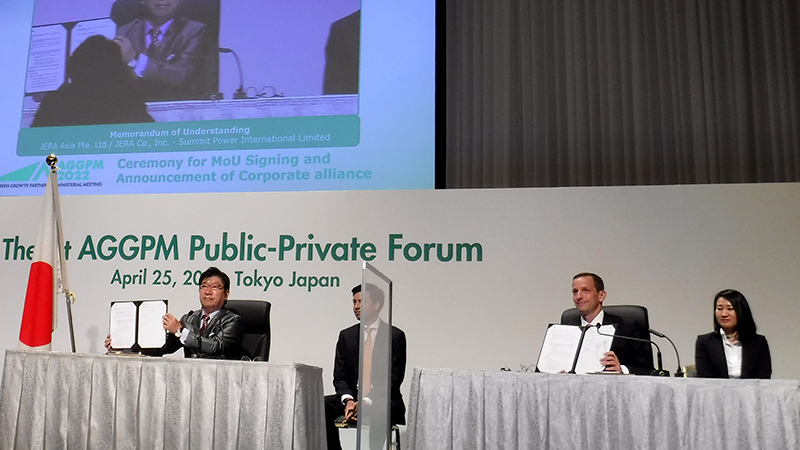Japan’s LNG trading giant Jera said it has signed decarbonization and energy transition agreements with Thailand’s Electricity Generating Public Company (Egco) and Bangladesh’s Summit Power International.
Jera says energy demand in Asia continues to grow and it sees gas-fired power generation, which emits less CO2 than power generation using other fossil fuels, as an energy source indispensable to moving the energy transition forward.
Gas-fired generation is also a flexible supplement to renewable energy, while hydrogen and ammonia have “great potential” as next generation fuels that would contribute to the decarbonization of thermal power generation.
In that regard, Jera signed a memorandum of understanding with Thailand’s power generation firm Egco to develop LNG value chain projects and establish a large-scale supply chain for hydrogen and ammonia.
According to the joint venture of Tepco and Chubu Electric, it has contributed to a stable supply of energy in Thailand as a shareholder with an approximately 12 percent stake in Egco through Tepdia Generating.
Thailand’s energy demand is expected to continue to increase in line with economic growth.
Jera believes that this cooperation with Egco would enable it to expand its earnings base, improve the reliability of its supply of LNG and next generation fuels, and secure economic efficiency.
Summit Power deal
In a separate statement, Jera said it has concluded a memorandum of understanding with the largest independent power producer in Bangladesh, Summit Power International.
Jera acquired 22 percent of Summit Power’s outstanding shares in October 2019.
Summit Power, a part of Summit Group, operates about 2.3 GW of power generation capacity or roughly 10 percent of Bangladesh’s power generation capacity.
In addition, it also operates the FSRU-based LNG import terminal located offshore Moheshkhali Island in the Bay of Bengal.
In line with its steady economic growth, Jera expects demand for electricity in Bangladesh to increase while the country is also making efforts to diversify its sources of power generation.
Also, in response to the decline in domestic natural gas production and its government’s policy scraping coal-fired power generation development, Bangladesh is accelerating its efforts to expand LNG use and to develop renewable energy.
In that regard, the memorandum indicates that Jera and Summit Power would collaborate in developing a decarbonization roadmap for the latter which would also help support Bangladesh’s economic growth ambitions and its Paris Agreement goals, the statement said.
Going forward, the two companies would also explore projects that create opportunities to utilize hydrogen and ammonia in ways that contribute to achieving these targets and that support the introduction of renewable energy such as storage batteries, Jera said.

